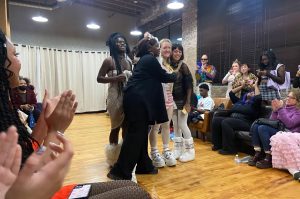
A recent article in AdAge asks, “Is Gay Too Mainstream for Its Own Media?” Logo, the first television station focused on the LGBT population, has recently shifted its programming to be more mainstream-focused. Other have followed suit. Is it time for the still-budding gay wedding industry to do the same?
Massachusetts was the first state in America to legalize state civil marriage for same-sex couples, starting a trend in the country in 2004. Until 2009, Massachusetts shared a monopoly on same-sex marriages with Connecticut, including any potential financial benefits those extra marriages brought.
A 2008 UCLA study suggested that if Massachusetts allowed non-residents of the state to wed, the state’s economy could reap $111 million in increased spending, along with great tax revenue.
Today, it is one of six states, along with the District of Columbia, that offer same-sex marriage. Another dozen offer some sort of civil unions, and even more offer a minimal version of benefits afforded to straight spouses. The process to legalize same-sex marriage is still gaining momentum. New York doubled the population of citizens living in states with same-sex marriage when it passed legislation in 2011, and others, such as Washington State, are close to or have already approved legislation to pass in 2012.
As more states offer benefits, the backlog of waiting same-sex couples may wane, with those who are waiting choosing to wed in their own state instead of a travel destination, such as New York, that has marriage equality. That time hasn’t come just yet, but it could happen if federal legislation opens gay marriage to all. This could result in the marriage industry opening up to gay marriage in the interest of profits, instead of having speciality gay-marriage firms.
“The best way to describe the expansion of the same-sex wedding market since Massachusetts legalized same-sex marriage is ‘participation,’” said
Kathryn Hamm, president of GayWeddings.com, a product and resource website for same-sex couples looking to tie the knot. “More wedding pros than ever are educating themselves on how to serve same-sex couples and more than ever are targeting their blogs, websites and ad campaigns in more inclusive ways.”
The Knot did just that. A massive national wedding industry publication showcasing services and products, The Knot launched a gay weddings mini-site to compliment their general-market site in 2008.
“When legislation passed in New York, page views for gay.weddings.com, that Sat. June 25th, saw a 166% increase,” said Anja Winikka, site editor for The Knot. “The average number of gay wedding members that signed up on theKnot.com, nearly doubled right after June 24, so we not only had a surge in traffic and page views, but a surge in members.”
New York, already a travel destination, reaped benefits by legalizing gay marriage, said Winikka. Other areas that have gay marriage have seen such a trend as well.
“Part of the reason we moved to D.C. was to have rights as a couple,” said Stephanie Shea, a Georgia native who moved to D.C. in 2011. “We are lucky because D.C. is unique in that it has both domestic partnerships and legal marriage for same sex couples. That works well for us because we can’t yet afford the wedding I dream of, but we can still have a handful of legal rights, which is very important when living so far from our families in Georgia. I will only live in states that will uphold my legal relationship.”
As big-ticket states for marriage equality, like New York, legalize marriage equality, the financial gains in smaller markets may dissipate with a less concentrated market both for the wedding sector and general economic spending. The potential for federal gay marriage equality legislation might further slow location-specific economic spending for gay weddings.
“I do think that, as more states recognize marriage equality, there will be fewer couples rushing to the altar in the days following legalization of same-sex marriage,” Hamm said. “The pent up demand of long-term committed couples wanting to marry legally will naturally wane and there will be a levelling off of requests. Instead, we’ll see that the mainstream market will have expanded to have included a minority population that it had not previously served.”
Many gay couples have been together for a long time, and therefore don’t spend the average $25,000 a typical marriage costs, Hamm said.
“We wanted a civil union primarily to get the few rights it offers,” said Victoria Shannon, a professor at DePaul University, who has been in a relationship with her partner for nearly 20 years. “The economy didn’t lose much from us because neither of us wanted anything expensive. We didn’t even go out to dinner to celebrate.”
Some younger couples who haven’t yet had the opportunity for a true long-term relationship, may be willing to spend money.
“I have not had my wedding yet, but I know I will spend more money and effort knowing it will be legal where I live and love,” Shea said. “Legality legitimizes things–doesn’t a ‘commitment ceremony’ sound like a much less fabulous affair than does a wedding? I estimate I will spend around $8,000 to $10,000 when the time comes.”
For those who are in a state that doesn’t offer civil marriage or full civil union rights, travelling remains an option.
“We are considering traveling somewhere to get a license,” said Justin Singleton, 29, a Wisconsin resident, who fears Wisconsin Governor Scott Walker may remove the state’s current limited rights for gay couples. “It’s something that we are looking forward to. But we won’t do that right away. For the meantime, we are planning a purely ceremonial marriage ceremony.”
In the past, the media has focused on potential economic impact for states, Hamm said. In the future, she believes the economic benefit will become secondary. If federal marriage were to pass, the gay marriage market would be further diluted and likely become mainstream.
Gay marriage could be moving to the federal level, with California’s Proposition 8 being considered unconstitutional by the state’s highest court, triggering a potential move to the Supreme Court. The Obama administration is refusing to defend the federal government’s ban on gay marriage, the Defense of Marriage Act, which could make the process easier.
Legal or not, some couples in the gay community say their loving, long-term relationships are what sustain them while they wait for full equality.
“The truth is that I already have the very best part of my ‘marriage,’” Singleton said. “I had it before I proposed. I will have it with or without the government’s blessing. I have the love of my life, who is also my best friend, and my greatest source of support.”











Be First to Comment